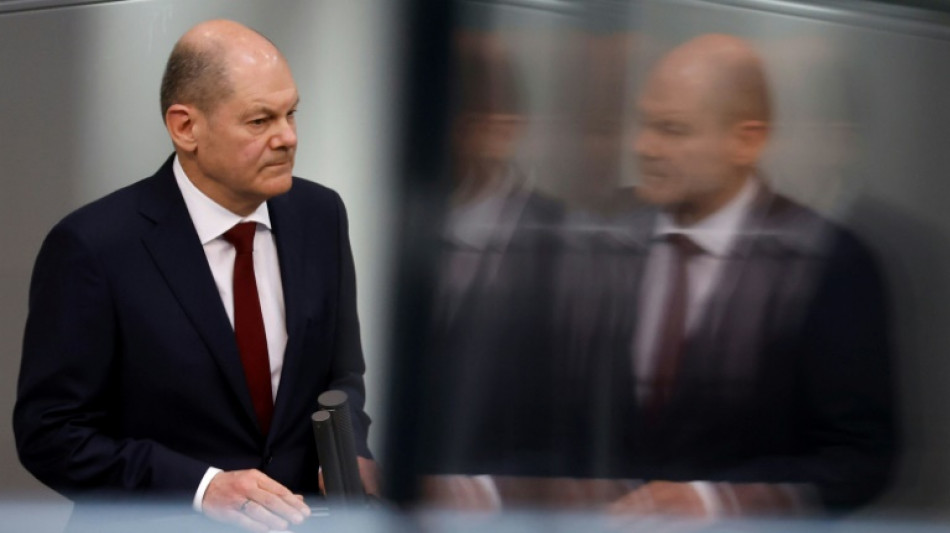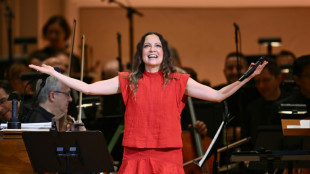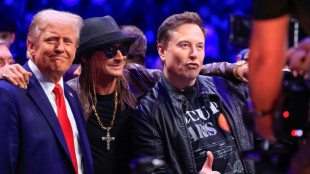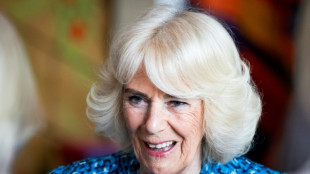
-
 South Korea president clings to power after martial law U-turn
South Korea president clings to power after martial law U-turn
-
Presidential vote seen as referendum on Romania's European future

-
 Hamilton bids farewell to Mercedes as Ferrari vie for title
Hamilton bids farewell to Mercedes as Ferrari vie for title
-
New Zealand unchanged in bid to hit back against England

-
 Macron seeks remedy to France's political crisis
Macron seeks remedy to France's political crisis
-
New Natalia Lafourcade album celebrates music's onstage evolutions

-
 Taiwan's Lai kicks off visit to US territory Guam
Taiwan's Lai kicks off visit to US territory Guam
-
Ivory Coast staple cassava meal gains UNESCO heritage status

-
 OpenAI to partner with military defense tech company
OpenAI to partner with military defense tech company
-
Liverpool held but Slot salutes 'special' Salah

-
 Man City needed to break losing 'routine', says Guardiola
Man City needed to break losing 'routine', says Guardiola
-
Leipzig down Frankfurt to reach German Cup quarters, Cologne strike late

-
 Mbappe admits penalty miss 'big mistake' as Bilbao beat Real Madrid
Mbappe admits penalty miss 'big mistake' as Bilbao beat Real Madrid
-
'Sad, disappointed' Mbappe pays penalty as Bilbao beat Real Madrid

-
 US stocks surge to records, shrugging off upheaval in South Korea, France
US stocks surge to records, shrugging off upheaval in South Korea, France
-
Liverpool held in Newcastle thriller, Arsenal inflict Amorim's first defeat

-
 Shiffrin confirms she'll miss Beaver Creek World Cup races
Shiffrin confirms she'll miss Beaver Creek World Cup races
-
Corner kings Arsenal beat Man Utd to close gap on Liverpool

-
 Mbappe pays penalty as Bilbao beat Real Madrid
Mbappe pays penalty as Bilbao beat Real Madrid
-
NFL Jaguars place Lawrence on injured reserve with concussion

-
 North Korea, Russia defence treaty comes into force
North Korea, Russia defence treaty comes into force
-
Openda hits brace as Leipzig beat Frankfurt in German Cup last 16

-
 Schar punishes Kelleher blunder as Newcastle hold Liverpool in thriller
Schar punishes Kelleher blunder as Newcastle hold Liverpool in thriller
-
De Bruyne masterclass helps Man City end seven-game winless streak

-
 Syrian rebels surround Hama 'from three sides', monitor says
Syrian rebels surround Hama 'from three sides', monitor says
-
Lawyers seek leniency for France rape trial defendants, blaming 'wolf' husband

-
 OpenAI chief 'believes' Musk will not abuse government power
OpenAI chief 'believes' Musk will not abuse government power
-
Thousands rally in Georgia after police raid opposition offices

-
 S. Korea opposition push to impeach president
S. Korea opposition push to impeach president
-
Powell 'not concerned' US Fed would lose independence under Trump

-
 French government falls in historic no-confidence vote
French government falls in historic no-confidence vote
-
Syrian White Helmets chief 'dreams' of never pulling a body out of rubble again

-
 NBA Suns lose Durant for at least a week with ankle injury
NBA Suns lose Durant for at least a week with ankle injury
-
Warhammer maker Games Workshop enters London's top stocks index

-
 Iran Nobel winner released for three weeks, 'unconditional' freedom urged
Iran Nobel winner released for three weeks, 'unconditional' freedom urged
-
Red Cross marks record numbers of humanitarians killed in 2024

-
 Johnson's Grand Slam 'no threat', says World Athletics boss Coe
Johnson's Grand Slam 'no threat', says World Athletics boss Coe
-
Qatar's emir and UK's Starmer talk trade as state visit ends

-
 Cuba suffers third nationwide blackout in two months
Cuba suffers third nationwide blackout in two months
-
Russia, Ukraine to send top diplomats to OSCE summit in Malta

-
 Spanish royals to attend memorial service for flood victims
Spanish royals to attend memorial service for flood victims
-
LPGA, USGA new policy requires female at birth or pre-puberty change

-
 Stick to current climate change laws, US tells top UN court
Stick to current climate change laws, US tells top UN court
-
British Museum chief says Marbles deal with Greece 'some distance' away

-
 Pope Francis receives electric popemobile from Mercedes
Pope Francis receives electric popemobile from Mercedes
-
Gaza civil defence: thousands flee Israeli strikes, evacuation calls

-
 Trump names billionaire private astronaut as next NASA chief
Trump names billionaire private astronaut as next NASA chief
-
Pidcock to leave INEOS Grenadiers at end of season

-
 Seoul stocks weaken, Paris advances despite political turmoil
Seoul stocks weaken, Paris advances despite political turmoil
-
South America summit hopes to seal 'historic' trade deal with EU


Boring to 'historic': the awakening of Germany's Olaf Scholz
Often described as predictable and "robotic", Chancellor Olaf Scholz has become emboldened since Russia's invasion of Ukraine, smashing policy taboos to steer Germany into "a new era" that could reshape its role on the world stage.
Just a few weeks ago, German media were openly asking "where is Scholz?", slamming the Social Democrat's perceived lack of leadership on pressing issues like the coronavirus pandemic and worsening Ukraine crisis.
But Moscow's attack on Ukraine last week has jolted the chancellor into action, culminating in what commentators have called a "historic" speech on Sunday.
Scholz, who has only been in office three months, spoke with uncharacteristic clarity when he unveiled a slew of defence and foreign policy shifts that promise to upend Germany's decades-long reluctance to raising its military profile.
"The Ukraine crisis has changed the chancellor. And now he's changing our country," the top-selling Bild daily wrote.
Addressing an emergency parliamentary session, Scholz told the nation that "we are now in a new era".
In a country haunted by post-war guilt, Scholz assured Germans that they were "on the right side of history" as Ukraine's allies.
Among the headline-grabbing announcements was a pledge to earmark 100 billion euros ($113 billion) this year alone to modernise the chronically underfunded the army, called the Bundeswehr.
Scholz also said that Europe's biggest economy would commit to spending more than two percent of Germany's gross domestic product on defence annually, surpassing even NATO's target.
His coalition government had earlier already reversed a ban on sending weapons to Ukraine, and halted the Nord Stream 2 gas pipeline between Germany and Russia.
The move came as a relief to the United States and European partners, who had begun to question Berlin's resolve in standing up to Moscow.
Some observers have speculated that it was perhaps no coincidence that Russian President Vladimir Putin timed his invasion after the departure of veteran chancellor Angela Merkel.
He had built a working relationship with her based on mutual respect and a shared history of living in ex-communist East Germany.
But if he sensed weakness in Berlin while the new government found its footing, his radical actions appear to have galvanised not just Scholz, but the nation.
More than 100,000 people took to the streets in Berlin at the weekend to protest against Russia's invasion.
- Surprises -
Der Spiegel weekly, which once described Scholz as "the embodiment of boredom in politics", praised the chancellor for displaying "the leadership that had been missing in recent weeks".
"Scholz, who is often rhetorically vague, has left no doubt about his determination," Spiegel wrote.
But Scholz has surprised observers before.
As Merkel's finance minister, he suspended Germany's cherished debt brake to unleash a "bazooka" in pandemic aid, and crossed a previous red line by backing a European Union recovery package partially funded by joint borrowing.
He also came from behind to win last year's general election, staying true to his boring-but-reliable persona while avoiding the gaffes that brought down rivals from the Green party and from Merkel's conservative camp.
He now heads Germany's first-ever three-way coalition, consisting of the Social Democratic Party (SPD), the Greens and the pro-business FDP.
Scholz's policy reversals mark a turning point for his centre-left SPD, which has historically championed close ties with Russia.
- 'Naive' -
Russia's war-mongering is a "rude awakening" that has forced the SPD "to throw decades-old convictions overboard", the conservative Frankfurter Allgemeine daily wrote.
Scholz has also distanced himself from former SPD chancellor Gerhard Schroeder, whose close friendship with Putin and Russian business dealings have become an embarrassment to the party.
At the same time, Scholz's new path marks a sharp break with the commerce-driven pragmatism of the Merkel years in dealing with Russia.
Merkel's emphasis on trade and dialogue with an increasingly belligerent Moscow during her four terms in office will now be seen in a different light, political scientist Ursula Muench told AFP.
"We will no longer praise her negotiating skills, but ask whether she and her government were too naive about Putin," she said.
F.Pavlenko--BTB


